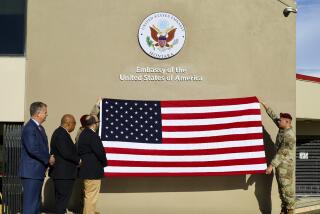HUMAN RIGHTS : U.S. Concern Over East Timor May Signal Asian Policy Change
- Share via
DENPASAR, Indonesia — The remote territory of East Timor has been a thorn in the Indonesian government’s side for years. Now a Clinton Administration decision to adopt a tougher stance on human rights violations there is being seen as a possible precursor to a fundamental change in U.S. human rights policy in Asia.
The departure came late last month in a little-noticed action when the United States joined in supporting a resolution of the U.N. Human Rights Commission expressing “deep concern” over rights violations in East Timor, a former Portuguese colony annexed by Indonesia in 1976. Under former Presidents Ronald Reagan and George Bush, the United States helped block similar resolutions condemning Indonesia’s behavior in East Timor. Indonesian government officials were reported by Asian diplomats to be stunned by the Clinton Administration shift.
Further, other countries, such as China and Malaysia, have flatly warned the United States that adopting tougher human rights positions could cost America jobs at home because of probable retaliation by Asian countries.
As a result, the decision on Timor is being studied widely around the region.
The U.N. action called on Indonesia to allow international experts on torture, executions and disappearances to visit the island to investigate allegations against Indonesia’s military. Indonesia condemned the charges as “unwarranted sweeping allegations.”
The Indonesian government has permitted selected diplomats and observers to visit the island recently to attend the carefully stage-managed trial of Jose Gusmao, 45, the leader of Fretilin, East Timor’s tiny independence movement.
Gusmao, known by his nom de guerre, Xanana, is charged with fomenting revolution and weapons offenses. A televised confession that he gave before the start of the trial prompted diplomats to wonder whether he had been tortured or threatened by the military.
Diplomats who have visited Timor--access to the island is controlled by the government--say Fretilin probably has fewer than 100 fighters after nearly two decades of Indonesian military rule.
Indonesia’s annexation of East Timor has never won the acceptance of the United Nations, which has repeatedly called for the people to decide their own future. West Timor has been part of Indonesia since Indonesian independence after World War II.
Tensions between the military and the local population reached a high in November, 1991, when troops opened fire on a crowd at a funeral in Dili, killing 60 to 100 people. Four officers and six enlisted men were court-martialed for the killings. But the longest sentence handed out was 18 months. The military has never admitted that more than 19 people were killed. But a government-appointed investigating commission said at least 50 people had died.
Most diplomats expect that Gusmao will be given a severe sentence, which will be commuted by the government as a sign of its leniency and flexibility.
But diplomats cautioned that, with restive populations elsewhere in the archipelago, it is unlikely that the government in Jakarta will go beyond that cosmetic gesture and grant the Timorese any degree of autonomy.
More to Read
Sign up for Essential California
The most important California stories and recommendations in your inbox every morning.
You may occasionally receive promotional content from the Los Angeles Times.













